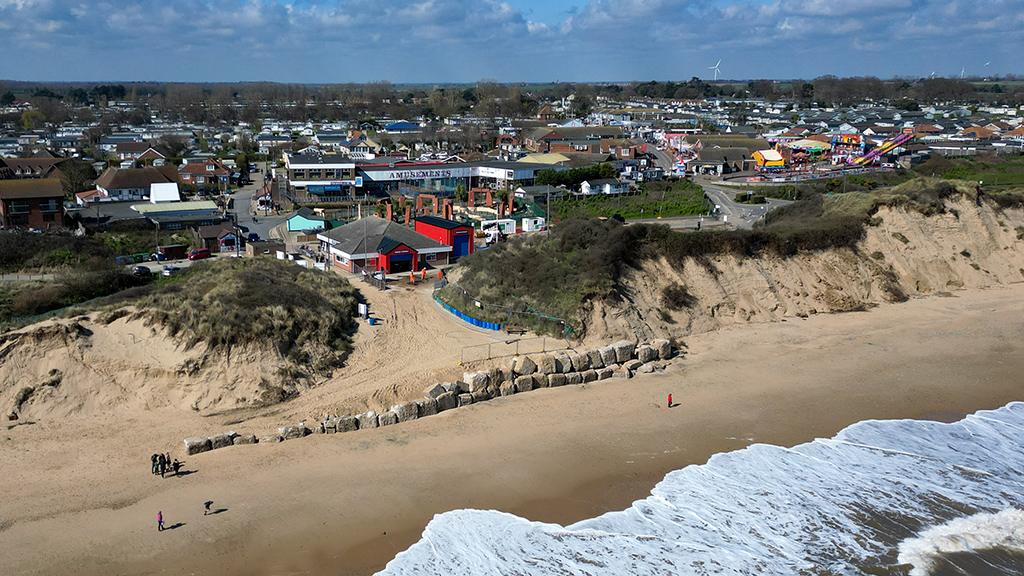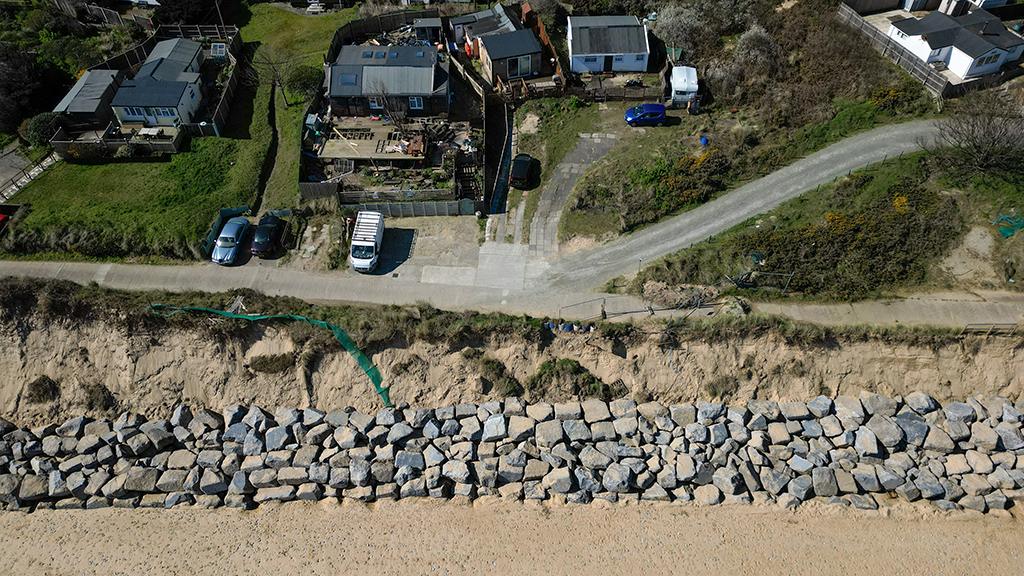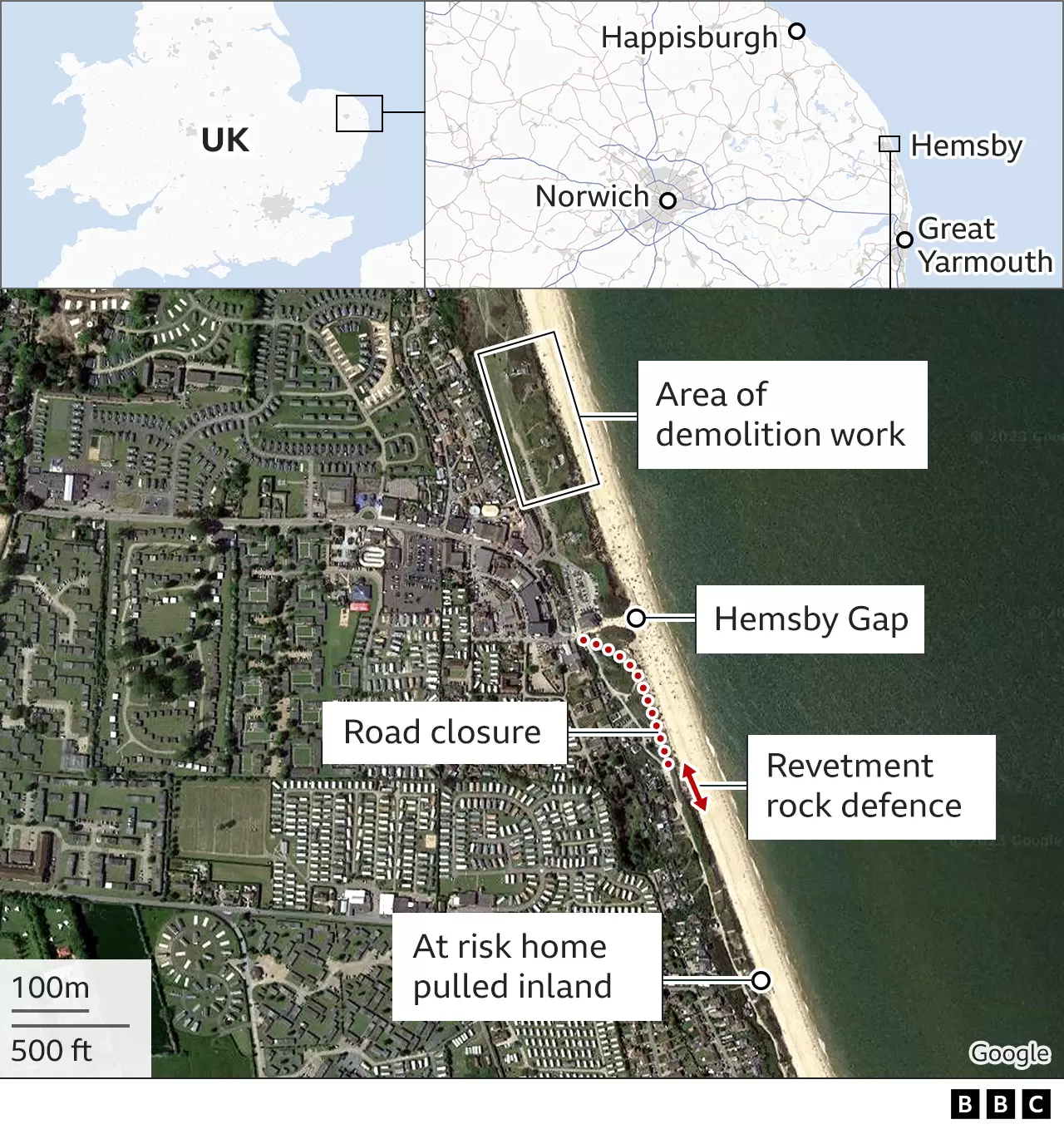Beach access returns as coastal defence completed

Public access to Hemsby beach has been restored at part of the coastal defence project
At a glance
An emergency temporary coastal defence at Hemsby has afforded the community time to work out what to do next
Nearly 2,000 tonnes of rock has gone into building the revetment
It will slow down the rate of erosion helping to ensure a vital access road remains open
The work has allowed beach access to return and for the independent lifeboat to resume its inshore service
- Published
Access to Hemsby beach has been restored after completion of a vital coastal defence project.
The beach, near Great Yarmouth in Norfolk, had to be closed when high tides claimed metres of sand from the access point known as "the gap".
Rapid erosion also threatened a collapse to the single access road leading to a number of properties on The Marrams.
An 80m (262ft) rock revetment, created as a temporary solution, has "bought time" for the community and authorities to secure a more permanent defence.

The revetment rock defence was placed under a vulnerable section of access road
The rock defence is double the length of what was originally planned.
"The initial 40m was only a high-level concept calculation and based upon what we thought we had in terms of rock," Coastal Partnership East said.
"Since then we have been able to source rock over and above what we initially believed was possible."
Created from nearly 2,000 tonnes of Norwegian granite, the "revetment will slow down the erosion to stop the cliff moving back at the rate it has been".
High tides at the start of March and rapid erosion left homes at risk of collapse.
The access road was also threatened and Hemsby Independent Lifeboat had to be taken out of service as the beach became inaccessible.
Five properties had to be demolished in less than two weeks before they fell from the top of the dunes to the beach below.
Hemsby erosion: How does a rock revetment coastal defence work?
Michael Copestake, from Balfour Beatty, who helped deliver the project working with Coastal Partnership East, said: "For the community, having a protective measure put in place brings an element of relief that something is being done.
"It was an emergency situation, so we've used three to six-tonne rocks to create a revetment," he said.
You might also be interested in
How many other Hemsbys are waiting to happen?
- Published17 March 2023
Take a 360° walk along coastal erosion site. Video, 00:10:08
- Published24 March 2023
Cliff-top home demolished before it falls on beach. Video, 00:01:05
- Published12 March 2023
Mr Copestake, who grew up in the area, added: "The defence slows the erosion... buying time for communities like Hemsby.
"It's not just a pile of rock - it's very much an engineered solution with a specific method for placing each rock so it locks into place.
"The structure takes the power out of the wave energy as it comes in and also catches material. After just a few days you can already see sand being caught within the revetment itself which shows it's doing its job."
Work has also been completed to install a rock defence to help protect the restored access point to the beach and provide a new ramp for the lifeboat so it can return to service.

A new beach access ramp has been installed as part of the work at Hemsby
Hemsby lifeboat crew member Chris Batten said: "We've had a couple of high tides since the rocks went in and they they've kept their integrity, as has the new ramp, so they've done a sterling job.
"They've underpinned just under the surface of the sand with rocks to sort of create stability and there's rocks have been dug in at least a metre as well so that's hopefully going to keep us on service for some time."
Funding for the £735,000 emergency defence project was split between Local Levy funding from the Anglian (Eastern) Regional Flood and Coastal Committee and Great Yarmouth Borough Council.
Plans for a permanent defence stretching 0.8 miles (1.3km) have been granted a licence by the Marine Management Organisation.
However, the council will need to find £15m to complete the work.

Find BBC News: East of England on Facebook, external, Instagram, external and Twitter, external. If you have a story for us, email eastofenglandnews@bbc.co.uk, external